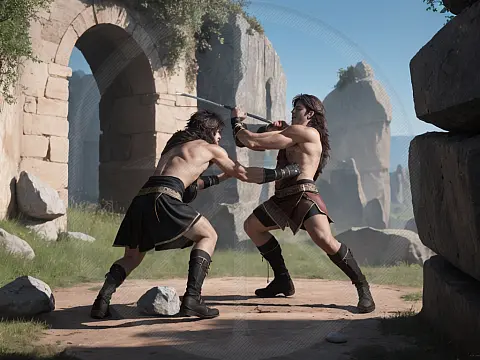The Unstoppable Tactics of Hannibal & CarthageDiscover the remarkable military tactics of Hannibal & Carthage, two ancient powers that changed the course of history.
A long time ago, when Rome was still a Republic, there was a major conflict between Rome and Carthage. Carthage was a North African city-state around 300 miles from Rome.
Carthage and Rome have never liked each other, but they had mostly ignored each other in the past. Both cities were busy establishing their own empires. Carthage has expanded into a vast empire. Carthage possessed a powerful army, a powerful fleet, and a powerful administration.
Rome took note of how huge Carthage was becoming one day. The issue, according to Rome, was that Carthage owned three islands off the coast of Italy. That was a little too near for comfort. Carthage was persuaded to join the Republic by Rome. Carthage was not convinced. For 20 years, Carthage and Rome fought. The Punic War was the first of its kind. Nobody came out on top. After 20 years of fighting, all they had accomplished was to kill many people and instil much hatred.
Carthage proposed a compromise to Rome to halt the battle. "If you go away and leave us alone," Carthage responded, "we'll give you the island of Sicily." The deal was accepted by Rome. They also grabbed Sardinia and Corsica, the other two Italian islands.
Carthage was enraged. They were, however, sick of fighting Rome. Carthage instead resolved to fight Spain and reclaim the territory they had lost there. The general left for Spain with his army and his nine-year-old son, Hannibal. Before leaving, Hannibal made his son swear that as soon as he was old enough, he would battle the Romans and make them pay for all the lives they had taken. Hannibal made a vow. That was the start of Hannibal's fame as a military genius.
While battling in Spain over the following several years, Hannibal learned to be a formidable commander. His father and his brothers had taught him well. He was, nevertheless, naturally cunning. Hannibal won most of his battles by devising ingenious strategies.
During battling at sea, Hannibal ordered his troops to drop barrels full of live snakes onto an enemy ship's deck. The adversary had not anticipated Hannibal's actions. They were unprepared to deal with snakes. Hannibal easily won that fight.
Once his father died, the soldiers in Spain chose him to be their new general a few years later. At the time, he was only 26 years old. Hannibal did not pause. He accepted the position, married a Spanish princess, and began battles with other Spanish cities. His objective was to capture the entire country of Spain.
One of the cities he targeted was a close friend of Rome. Rome agreed to pitch in. Yet, Rome did not send assistance to Spain. They declared war on Hannibal's hometown and the heart of the Carthage Empire, Carthage.
Hannibal was okay with it. He had never forgotten his vow to his father. Carthage had given him orders to fight Rome. He needed to catch Rome off guard. He decided to attack Rome from the north. It would never happen in Rome. Hannibal's strategy was to march 90,000-foot soldiers, 12,000 cavalry, and 37 elephants from Spain through Gaul, over the Alps, and into Italy, then forcefully conquer Rome.
His strategy did not go as planned. The path was more difficult than he had anticipated. On the journey, he lost virtually all his elephants and half of his troops. He expected support from individuals in Northern Italy. They assisted him by leaving him alone, but they refused to join his army. Carthage lacked a strong navy with which to convey supplies.
Hannibal devised a fresh strategy. Rather than advancing on Rome, he drove it insane by destroying minor strongholds and stealing food and weaponry meant for Rome. Hannibal and his army remained on the Italian peninsula for 15 years, spreading havoc wherever they could.
Rome had had enough of Hannibal in 203 BCE. They were unable to apprehend him, so they invaded Carthage instead. In a panic, Carthage summoned Hannibal. Carthage had agreed to peace negotiations with Rome before Hannibal arrived. Their terms were as follows:
- Carthage would abandon Spain, Gaul, and Italy
- Carthage's navy would be reduced to 20 warships
- Carthage would have to pay 5000 talents (the local currency) in war damages
The leaders of Carthage changed their views after Hannibal returned home. They opted not to keep their end of the bargain. Rome was enraged. They dispatched an army to Carthage. Hannibal's army was defeated, but Hannibal escaped. Rome was considerably angrier than usual. Carthage had failed to keep its commitment. Again. Rome still had no control over Hannibal.
The peace terms were harsher this time.
- Carthage would abandon Spain, Gaul, and Italy
- Carthage's navy would be reduced to 10 warships
- Carthage was forced to pay 10000 talents in war damages for the next 50 years, in 50 equal annual instalments.
Carthage decided to call it quits. They departed from Spain. They departed from Gaul. They departed from Italy. They lowered the size of their navy. Every year, they quickly paid the talents they owed. The Second Punic War has come to an end.
But this did not deter Hannibal. Hannibal spent the rest of his life opposing ancient Rome's expanding authority. The Romans never gave up searching for him. Despite their best efforts, the Romans were unable to catch up with Hannibal until he was 64 years old! They didn't get him even then. He opted to die by ingesting the poison contained within his ring.
Hannibal remains one of history's most brilliant military brains and one of the world's finest generals.










